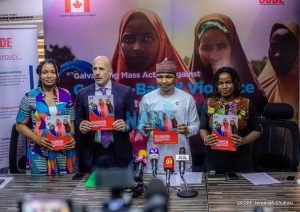
Canadian High Commissioner to Nigeria, Mr James Christoff (2nd left) and Mr Hamzat Lawal, the Chief Executive, Connected Development (CODE) (3rd Left) with others at an event to to mark the International Womens Day in Abuja on Wednesday
By Angela Atabo/ Bukola Adewumi
Canadian High Commission to Nigeria and Connected Development (CODE) have tasked the Federal Government on the need to enact policies that will protect women and girls.
They made the call at a news conference on Wednesday, in Abuja to mark the International Womens Day (IWD) and to share key findings on CODEs GMAA-K project.
The project Galvanizing Mass Action Against Gender-Based Violence in Kano State (GMAA-K) was implemented in Kano State address inequality among others.
Mr Hamzat Lawal, the Chief Executive, CODE. said the call to enact women friendly laws was imperative to address the ills against women in the society .
Lawal said Nigeria ranked 123rd out of 146 countries on the World Gender Gap Gender Equality Index of 2022.
He said that prior to the World Gender Gap ranking, Thomson Reuters Foundation conducted a survey in 2018, and Nigeria ranked 9th in the top 10 list of most dangerous countries for women.
He said that Sexual and Gender-based Violence (SGBV) was widespread in Nigeria, with 30 per cent of women aged 15 to 49 having reported experiences of sexual abuse.
He added that 43 per cent of girls were married off before age 18, and 17 per cent married off before they turned 15 and Kano State, in the Northwestern part of the country is a reflective of these peculiarities.
SGBV fueled by cultural and religious factors continues spreading and the state lacks enabling laws to address SGBV, or sanction offenders and ensure victims/survivors get the multidimensional support they require.
Today, we are celebrating International Womens Day and calling all stakeholders across Nigeria to embrace equality not by mere show of words but by actions such as enacting policies that will protect women and girls in society.
The action plan got inputs from various Kano state actors and non-state actors. As of Dec. 1, 2022, the State Assembly held a public hearing on the Child Protection Bill but the house failed to pass the bills as committed to all stakeholders.
It is disheartening to say that policies such as this that ought to protect women and children in society are given a back seat in our society, in Kano state.
Lawal said that commitments from government stakeholders had not been upheld, particularly on the creation of more Sexual Assault Referral Centres (SARC) in each Kano emirate council as Kano state only has one.
The reason CODE commissioned research is to highlight the impact of the project in the state, on lessons learnt, and recommendations for future direction of SGBV programming in Kano state.
Lawal said that to address SGBV in Kano, CODE through funding from the Canadian High Commission in Nigeria inaugurated the Galvanising Mass Action Against Gender-Based Violence in Kano State (GMAA-K)project.
He said the project aimed at galvanizing the public and empowering women to mount advocacies against SGBV and domestic abuse as well as engage the government for the enactment of the Violence Against Persons Prohibition (VAPP) law.
He said CODE in January 2021, implemented the first phase of the GMAA-K in Kano, as the Canadian High Commission seeing the inroads being made with the project in Kano supported the second phase of the project in November 2021.
The Canadian High Commissioner to Nigeria, Mr James Christoff, said this years IWD was a reminder that all women from all ages and walks of life have a place in every aspect of the society.
Today, we celebrate the achievements of all women and girls who are building a stronger and more inclusive future, but we cannot forget that there is more work to be done.
In Nigeria, this is particularly important as we know Nigeria is facing an SGBV crisis .
At homes, in schools, on the streets, at work, on the internet, between conflict zones and IDP camps; SGBV has become normalised and most often goes unpunished sometimes blaming survivors.
Certain groups such as women with disabilities are at greater risk to experience gender-based violence, the scale of this issue is tremendous.
Christoff said that gender equality and empowerment of women and girls were at the heart of the Canadas Feminist Foreign policies due to thebelief that gender equality was key to building a more peaceful, inclusive and prosperous world.
He said that the commission under its Canada Fund for Local Initiatives had been working with CODE over two years to galvanise action against gender based violence in Kano state.
He however, hoped that the report would chat the way forward to curb SGBV.(NAN)(www.nannews.ng)
Edited by Modupe Adeloye/Grace Yussuf
Source: NAN News